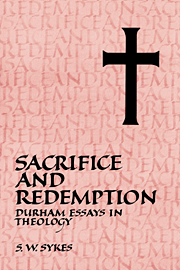Book contents
- Frontmatter
- Contents
- List of contributors
- Prefatory note
- Introduction
- PART I
- PART II
- PART III
- PART IV
- 15 The semantics of sacrifice
- 16 Outline of a theology of sacrifice
- 17 Christ died for us: reflections on the sacrificial language of salvation
- Index of biblical and ancient references
- Index of persons
16 - Outline of a theology of sacrifice
Published online by Cambridge University Press: 10 March 2010
- Frontmatter
- Contents
- List of contributors
- Prefatory note
- Introduction
- PART I
- PART II
- PART III
- PART IV
- 15 The semantics of sacrifice
- 16 Outline of a theology of sacrifice
- 17 Christ died for us: reflections on the sacrificial language of salvation
- Index of biblical and ancient references
- Index of persons
Summary
The only adequate reason for recognizing in sacrifice the central notion, or one of the central notions, of a systematic Christian theology lies in the centrality of worship for the Christian tradition. A theology of sacrifice will be, therefore, a theology in which worship plays a central role. It will be forced to raise, in an acute form, the question of what theological activity actually is, and how it is related to the total activity of the Christian Church. None of the matters which are referred to above can be treated as selfevident. Above all, there is no established locating of worship in relation to theology or ethics. The tag, lex orandi, lex credendi, is capable of numerous different interpretations (Wainwright 1980, 2i8ff.); attempts to paraphrase it are occasionally false because of an over-generous evaluation of the precision of liturgical tradition (‘one ought to believe, as one prays’), or vacuous through a willingness to balance worship and intellectual formulation (‘how one ought to pray, is how one ought to believe’). Accordingly this essay will have to proceed methodically through several stages.
THE CENTRALITY OF WORSHIP
In his analysis of the dimensions of religions, Ninian Smart (19 71) lists six, which together constitute a single organism. The aspects, or dimensions, are rituals, myths, doctrines, ethical teachings and social institutions, all animated by the sixth dimension, religious experiences. By rituals Smart means religious services of various degrees of elaborateness, and also techniques of self-training (such as yoga). He asserts that rituals have both an inner and an outer aspect, and may degenerate into ‘mere rituals’.
- Type
- Chapter
- Information
- Sacrifice and RedemptionDurham Essays in Theology, pp. 282 - 298Publisher: Cambridge University PressPrint publication year: 1991



